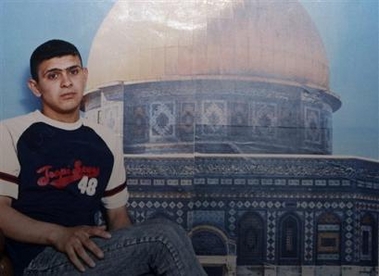|
Blast kills 5 Israelis, erodes peace hopes
(AP)
Updated: 2005-10-27 08:47 "Today, Israelis heard two extremists speak openly about destroying the
Jewish state. One was the new president of Iran, and the other was the leader of
Hamas, Mahmoud Zahar. And it appears the problem with these extremists is that
they followed through on their violent declarations with violent actions," Regev
told The Associated Press.
White House spokesman Scott McClellan condemned the bombing and called on the
Palestinian leadership to crack down on militants.

This is an undated picture of 20-year-old son
Hassan Abu Zeid, with the background of a picture of the Dome of the Rock,
one of Islam's shrines built on the Temple Mount, in Jerusalem, taken from
the family album from his house in the West Bank town of Qabatiyeh
Wednesday Oct. 26, 2005.[AP] | "The Palestinian
Authority needs to do more to end the violence and prevent terrorist attacks
from being carried out," he said. "The terrorist attacks that take place only
undermine the leadership of President Abbas and undermine his principle of one
authority, one law, one gun."
Abbas, in a speech before parliament, lashed out at the militants, saying
they had no right to violate a February cease-fire. "No one has the right to
respond here and there, unilaterally," he said.
Later, Abbas condemned the suicide attack, saying: "It harms Palestinian
interests and could widen the cycle of violence, chaos, extremism and
bloodshed."
"It is not permitted for anyone to take the law into their hands," he added.
In a phone call to the AP, Islamic Jihad said the bombing was to avenge the
killing of Luay Saadi, leader of the group's military wing in the West Bank.
Saadi died in a shootout with Israeli soldiers Monday.
In Gaza on Wednesday evening, dozens of masked Islamic Jihad militants held a
news conference at which they celebrated the attack in Hadera as a "great
victory as a message to our beloved Palestinian people and Islamic and Arab
nations."
Wednesday also marked the 10th anniversary of the assassination of Islamic
Jihad chief Fathi Shekaki in Malta — a killing widely attributed to Israel.
Islamic Jihad signed on to an informal truce with Israel in February, but
made the pledge meaningless by reserving the right to retaliate for any
perceived Israeli violations. The four last suicide bombings in Israel were
carried out by Islamic Jihad. These blasts killed 15 Israelis and wounded
dozens.
In response, Israeli forces have stepped up their hunt for Islamic Jihad
militants in the West Bank. In its first move after the Hadera attack, Israel
canceled a scheduled meeting Wednesday between the Israeli and Palestinian
communications ministers.
Islamic Jihad has been trying to distinguish itself from Hamas, its main
political rival, which since the cease-fire agreement has refrained from suicide
attacks in Israel. Leading Islamic Jihad members said privately their group
keeps carrying out attacks because it wants to sharpen its image as less willing
to compromise than Hamas, which is increasingly transforming itself into a
political party.
Hamas is competing in parliament elections in January and is more in tune
with Palestinian public opinion. Palestinians would likely blame militants for
new hardships caused by Israeli retaliation for attacks, and Hamas does not want
to turn public opinion against it.
Islamic Jihad is boycotting the balloting. The group has also received money
from Iran, funneled to its West Bank cells by Hezbollah guerrillas in Lebanon.
Wednesday's suicide bomber was identified as a 20-year-old from the West Bank
town of Qabatiyeh. His name, Hassan Abu Zeid, was announced over a bullhorn in
Qabatiyeh, residents said. Israeli police said the man had been standing in line
at the falafel stand before blowing himself up.
His parents were evacuating their home, fearing an Israeli response. His
mother, Raqaiah, wailed, "Where are you, my dear son?" Relatives said he worked
as a blacksmith with his father and disappeared after morning prayers Wednesday.
Six people, including the bomber, were killed in the blast, rescue service
officials said. More than 30 people were wounded, nine of them seriously, they
said.
Hadera is a Jewish working-class town of 75,000. Many of its residents are
immigrants from North Africa and their descendants, alongside newer arrivals
from the former Soviet Union.
The most recent suicide bombing in Israel, on Aug. 28 in Beersheba, killed
only the bomber. Before that, a July 12 suicide blast in Netanya killed five
Israelis.
Israel's withdrawal from Gaza last month has raised hopes for a return to
Mideast peacemaking after five years of bloodshed. However, the sides have
failed to capitalize on the pullout's momentum.
Israeli officials blamed Abbas' government for failing to control extremists.
"The Palestinian Authority talks but doesn't do anything," Internal Security
Minister Gideon Ezra told Israel Radio.
|